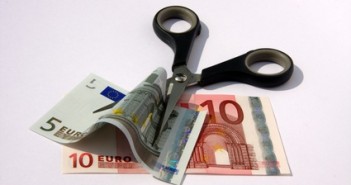EUR/USDÂ started the week with a minor gap for a change, but the direction afterwards remained the same: downwards. The pair lost another support line after expectations from the EU Summit fell once again. Yields on Spanish and Italian bonds change course rise once again. With the risk off mood in control, more doubts about Chinese strength emerged over the weekend.Â
Here’s an update on technicals, fundamentals and what’s going on in the markets.
EUR/USD Technicals
- Asian session: Euro/dollar opened marginally lower than Friday’s close and extended the fall at the beginning of the European session.
- Current range: 1.2440 to 1.2520.

- Further levels in both directions: Below: 1.2440, 1.24,, 1.2330, 1.2288, 1.22
- Above: 1.2520, 1.2587, 1.2660, 1.2760, 1.2814 and 1.2873, 1.29 and 1.2960.
- 1.2440 is still far, but it proved its strength in the past.
- After the loss of 1.2520, it turns into resistance.
Euro/Dollar opens the week with a slide – click on the graph to enlarge.
EUR/USD Fundamentals
- 14:00 USÂ New Home Sales. Exp. 347K.
For more events and lines, see the EUR/USD
EUR/USD Sentiment
- EU Summit Awaited: On Thursday and Friday, leaders of all 27 EU countries meet in an economic summit. There are too many issues on the agenda, and a swift resolution has little chances. Germany is more and more isolated in the international scene: the G-20 summit didn’t provide any calming message, as Germany remained tough on measures to shore up the zone. Merkel is also under pressure from the German supreme court, which delays the ESM. The euro might strengthen towards the event but fall afterwards. See 4 reasons to expect a disappointment.
- Spain submits formal aid request:  As expected, Spain is sending an official letter in request for aid today. Yields on Spanish 10 year bonds resumed their rises (to 6.50%) in the new week, after falling nicely on the the hopes that the bailout funds could buy Spanish bonds directly. An independent assessment discussed a shortage of only 62 billion euros in the worst case scenario As with the bailout announcement, that had 8 holes, also this assessment seems short of mark and could certainly be revised tot he upside. Spanish banks are not famous for their transparency. Spain is begging for ECB help, but not getting any.
- Chinese numbers hiding real picture: The New York Times reports that electricity consumption data, which is often considered a reliable measure of the economy, has been played with, and that the real picture is worse. This boosts the safe haven dollar as well.
- Greek leadership recovering: Both the the new Prime Minister Samaras and his new finance minister were hospitalized due to different reasons. They will not attend the EU Summit, and more importantly, this delays the visit of the EU / ECB / IMF troika which is supposed to decide on the next trance of aid. Before entering hospital the new government presented a long list of changes to the bailout program. The EU, particularly Germany, will have to show some flexibility on the bailout terms if it is serious about keeping Greece in the EZ. There are discussions of extending the Greek targets, but Greece is likely to miss those as well
- Market digests Fed decision: After the Fed decided not to introduce QE, but did announce that it would extend Operation Twist, Bernanke’s words convinced some analysts that QE3 is just one meeting away. However, the mood has significantly changed now. Dollar printing fuels the price of oil. Without QE3, we see WTI falling below $80. This also helps the dollar.
- ECB Lowers Collateral Demands: The European Central Bank decided to lower the grade of bonds it accepts as collateral, adapting itself to the falling ratings of European countries. This move was heavily criticized by the German Bundesbank. This objection shows that any new move will be limited.
- Contagion to Germany:  One more important German survey is waiting, but data so far has been awful: the ZEW Economic Sentiment PMIs both fell below the market forecast. The once invincible German economy appears to be sputtering, and this could spell disaster for the Euro-zone.
- Italy’s Monti sets alarms: The Italian PM Mario Monti asks for help from the Germans and the ECB as the situation deteriorates. The Euro-zone’s third largest economy is also suffering from a problematic banking system. This may explode later on. The economy isn’t doing much better, as GDP is squeezing fast. Italy cannot hide behind Spain for too long. If the economy continues to deteriorate, Italy could be the next EZ member to hop onto the bailout bandwagon.



